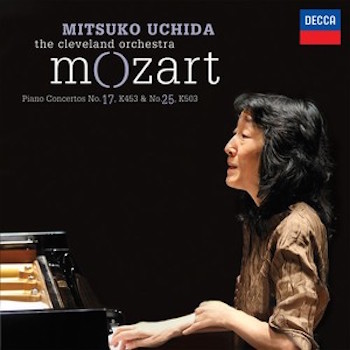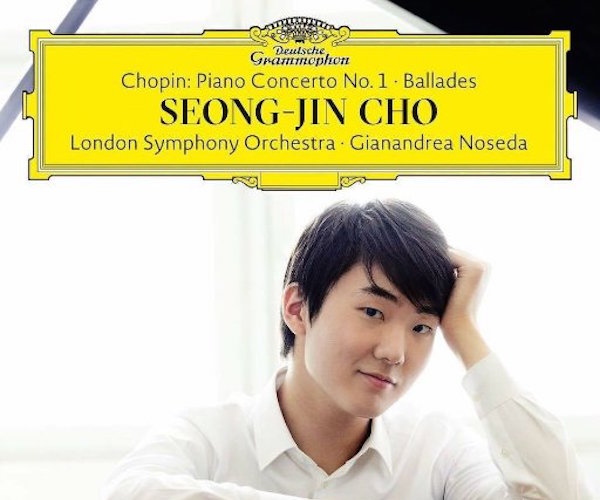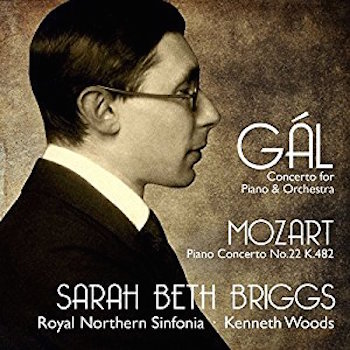Classical CD Reviews: Mitsuko Uchida plays Mozart, Seong-Jin Cho plays Chopin, and Hans Gal’s Piano Concerto
Among the three CDs reviewed is a particular treat — a new recording that really, truly matters.
By Jonathan Blumhofer

If you ever wondered how great artistry overcomes unpromising musical choices, look no further than Mitsuko Uchida’s new recording of Mozart’s Piano Concertos nos. 17 and 25. Tempos are deliberate. Each movement of the G-major Concerto (no. 17), for instance, clocks in at nearly a minute longer than Alfred Brendel’s none-too-speedy recording with Neville Marriner and the Academy of St. Martin-in-the-Fields.
The Cleveland Orchestra, which accompanies Uchida, makes no effort to disguise the fact that it’s a modern ensemble, not a period one, though the strings seem to be somewhat reduced in number. Granted, period vs. modern orchestras in this repertoire is a matter of taste, but, given the vigor and brio of recent period-ensemble recordings of Mozart concerti, the latter pairing is, arguably, preferable. On top of that, Uchida’s general approach to Mozart, which is often on the gentle side, by itself isn’t, to these ears, the ideal one to follow.
What makes this disc such a great one, then? Simply put, Uchida’s interpretation exceeds the sum of its parts. Her tone is famously pearly. She draws out the music’s lyrical writing without ever forcing things. And she’s in no hurry to get through these pieces.
But she shapes every phrase impeccably. Her rhythm is precise. Each run of sixteenth notes (or eight notes or thirty-second notes) is articulated with driving energy. Textures are balanced with pristine clarity. There’s lots of brain in it, to be sure. But there’s more heart. In a word, her playing is irresistible.
This is perhaps most remarkable when talking about Uchida’s performance of the G-major Concerto, which often feels like it’s slower than it should be. Yet Uchida’s playing is so intelligent and well-conceived that she carries her argument. The heart of the interpretation is the second movement, which is about as intensely melancholic here as I’ve heard it anywhere. That helps one make some sense of Uchida’s stately take on the opening movement and her slightly-less-than-bubbly approach to the charming finale.
More conventional, in tempo at least, is her interpretation on the C-major Concerto. This is a great, radiant concerto and Uchida makes the solo part blaze like the sun on an afternoon in the Berkshires in July. There’s an impellent quality to her playing, even in the quieter sections: the music’s climaxes, especially in the outer movements, are truly cathartic moments, earned and enjoyed to the max.
Throughout, the Cleveland Orchestra accompanies Uchida with perfectly-matched energy and color. Both concerti offer ample woodwind solos, and there’s some particularly fine playing from principal flute Joshua Smith and principal oboe Frank Rosenwein.
*****

Seong-Jin Cho won last year’s Chopin Competition in Warsaw and, like Rafał Blechacz a decade before him, was quickly signed by Deutsche Grammophon. Now comes his debut recording for the Yellow Label, of music by – who else? – Chopin.
Appropriately, he does a nice job with it. Cho’s reading of the Piano Concerto no. 1 is, on the whole, bright-toned and clean-textured. He’s got a real feeling for the music, its lyricism, its many fluctuations of tempo, and its dreamy poeticism. His playing of the Concerto’s many octave runs is precise and, while some fast passages result in the occasional blurry surface, they’re the exception, not the rule. On the whole, his is a vibrant, impassioned reading of the Concerto, with a sweeping performance of its big first movement; a gorgeous, dreamy second; and a robust, rhythmically astute account of the finale. Gianandrea Noseda, soon to become music director of the National Symphony, here conducts the London Symphony in a warm, nuanced accompaniment.
Filling out the disc are Chopin’s four Ballades, and there’s much to like about Cho’s playing in the set. They brim with color. Textures are, by and large, lucid. Tempos are middle-of-the-road, not veering too far one way or another. Expressively, the most successful are the last two, which brim with poignancy – especially the long, lyrical stretches of the F minor (no. 4). At times, parts of the first two Ballades seem a bit structurally incoherent. But even then there are moments, like the busy middle section of no. 1, with its stretches of right-hand octaves, and the recurring pastoral tune in no. 2, where Cho’s playing regains focus and dazzles with its concentration and inner warmth.
Where does Cho go from here? Well, that’s anyone’s guess. What will he make of Schubert, Schumann, Brahms, Debussy, and Ravel? What of the Beethoven sonatas? Tchaikovsky’s concertos? Contemporary music? That all remains to be seen. Surely, there’s room for his playing to grow in style and emotional depth. But, from the evidence of this disc, Cho’s a fine and sensitive musician to begin with. His chops are impressive. He’s the type of player you want to succeed and develop. Here’s to hoping he does.
*****

What a treat it is to come across a new recording that really, truly matters. Such is the case/experience with Avie Records’ release of Hans Gal’s Piano Concerto. Gal was among the luckier of his generation, most of whom were systematically murdered by the Nazis. A Czech Jew, he escaped to England where, despite a hard life (his youngest son, overwhelmed by the times, took his life in 1942; several relatives did the same to avoid deportation to concentration camps) and his increasing neglect by the music establishment, he kept composing away.
The Piano Concerto dates from 1949 and it’s firmly rooted in the great tradition of the mid-20th-century keyboard concerto, circa 1920-1940. It’s brims with music that, on first impression, is meant to charm and impress. The solo part is quite involved and rather continuous – the piano’s the first and last instrument you hear in the piece, after all. Moments of it evoke the jaunty brio of Prokofiev, the tonal allure of Debussy, and, sometimes, the lyricism of Rachmaninoff, but everything is put together with such style and charisma that the music never sounds derivative. Quite the contrary: it has a personality all its own – or, more accurately, Gal’s.
And pianist Sarah Beth Briggs proves an inspired advocate for Gal’s voice. Her playing is wonderfully alive in the outer movements, whose motoric sections require a certain stamina and lightness of touch. She’s ably demonstrates both here. The slow middle movement, with its several luminous orchestral solos framing introspective moments for the piano plus a driving middle section is both beautifully voiced (between soloist and ensemble) and played with heartrending feeling.
There’s much to like, too, in her reading of Mozart’s Piano Concerto no. 22 that completes the disc. Tempos are lively, textures are clear, energy never flags, and the melodic line – whether a straight-out tune or a texture of suspensions – is always shaped with delicacy and care.
In both pieces, Briggs is accompanied with gusto by the Royal Northern Sinfonia (RNS) and conductor Kenneth Woods. Woods is something of a Gal specialist – he made a fantastic recording of the complete symphonies a couple of years back (also on Avie) – and he’s got clear sympathy for the Piano Concerto, so well-paced, -shaped, and excellently balanced is each movement. The RNS revels in all of it, playing with sweeping color, propulsive energy, and palpable joy. Ditto for the Mozart, where the wind playing in the Harmoniemusik sections is particularly rich. In short, one of 2016’s finest releases.
Jonathan Blumhofer is a composer and violist who has been active in the greater Boston area since 2004. His music has received numerous awards and been performed by various ensembles, including the American Composers Orchestra, Kiev Philharmonic, Camerata Chicago, Xanthos Ensemble, and Juventas New Music Group. Since receiving his doctorate from Boston University in 2010, Jon has taught at Clark University, Worcester Polytechnic Institute, and online for the University of Phoenix, in addition to writing music criticism for the Worcester Telegram & Gazette.
Tagged: Hans Gal, Kenneth Woods, Mitsuko Uchida, Sarah Beth Briggs
